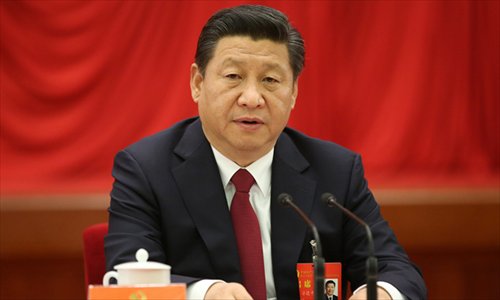China forges legal blueprint
Following Constitution centerpiece of plenary session

Members of the Standing Committee of the Political Bureau of the Central Committee of the Communist Party of China (CPC) take a vote at the Fourth Plenum of the 18th CPC Central Committee on Thursday in Beijing. Photo: Xinhua

Xi Jinping, general secretary of the Central Committee of the Communist Party of China (CPC), speaks at the Fourth Plenum of the 18th CPC Central Committee on Thursday in Beijing. Photo: Xinhua
The Communist Party of China (CPC) laid down far-reaching blueprints for the rule of law in the country during a key meeting this week, with the statements highlighting the overarching role of the Constitution, steps to build a law-abiding government, ways to safeguard judicial justice and the importance of promoting judicial credibility.
A communiqué was released to elaborate on the rule of law after the fourth plenary session of the 18th CPC Central Committee concluded on Thursday. The session was held in Beijing from Monday to Thursday and attended by 363 members and alternate members of the body.
This was the first time a plenary session of the CPC Central Committee has taken the rule of law as its central theme, and analysts have hailed the meeting as major progress in the construction of the Chinese legal system.
Ruled by the Constitution
"Efforts to adhere to the rule of law should give priority to following the Constitution, and governing by law should put governing in line with Constitution at the forefront," said the communiqué.
It said the National People's Congress (NPC) and its Standing Committee should play a better role in supervising the Constitution's implementation. Moreover, procedural and systematic rules regarding the interpretation of the Constitution should be improved.
The document also urged that systems and mechanisms should be established to ensure local-level people's congresses play a leading role in legislation, and cities with subordinate districts will be granted local legislative power in accordance with the law.
Tong Zhiwei, a legal professor from the East China University of Political Science and Law in Shanghai, said that the fact the Party is placing unprecedented importance on ruling according to the Constitution means that the country is getting back to the essence of the rule of law.
Tong said that it is also the first time that a Party meeting communiqué has raised the interpretation of the Constitution. "In the past six decades, our legislature has never interpreted the Constitution and finally we're going to activate the important procedures."
Tong said the procedures mean many legal controversies will be solved through the Constitution and both the Constitution and the NPC will play a more important role.
A law-abiding government
According to the communiqué, China will work to build a law-abiding government.
A mechanism to examine the legitimacy of major decision-making in various levels of government should be set up, with a lifelong liability accounting system for major decisions and a retrospective mechanism to hold people accountable for incorrect decisions, the document said.
Wang Jingbo, an anti-corruption expert at the China University of Political Science and Law, told the Global Times that setting up a law-abiding government is critical to avoiding power abuse and corruption.
Some officials have made some random decisions because they assumed there was no way to punish them once they had left the position, Wang noted.
"The lifelong liability accounting system will make it more feasible to supervise officials' decision making," she added.
Justice and judicial credibility
In line with the decisions of the third plenary session of the 18th CPC Central Committee in last November, the communiqué of the fourth plenum also put more focus on ensuring judicial justice and promoting judicial credibility.
A mechanism will be set up to record officials who interfere in judicial cases and name them publicly, in order to hold them accountable.
"It is an improvement and a new method for preventing officials or administrative organs from interfering in judicial works, as this has happened in many regions across China," said Bi Yuqian, a law professor at the China University of Political Science and Law.
China's top court, the Supreme People's Court, will set up circuit courts to facilitate the handling of judicial cases filed by the public from local communities.
The country will explore establishing courts and procuratorates with jurisdictions spanning across different administrative regions.
The country will also seek to build up a system in which prosecuting bodies can institute public interest litigation.
"It is the first time for China's top court to set up circuit courts to handle local cases. It could be an effective way to crack down on regional protectionism." Bi said.
Currently, under China's system, cases reach a final verdict after trials under at least two different levels of courts.
"As the SPC is the top court, such a plan in the communiqué might trigger changes in China's judiciary," Bi noted.
The document also said China will try to select lawmakers, judges and prosecutors from qualified lawyers and law experts.
China's courts have already begun recruiting legal experts as judges since last November.
A highlight of the newly-released communiqué is the fact that legal experts can be selected as lawmakers, Bi noted. "It will make lawmaking process more professional which could also help ensure the credibility of the law."
Xinhua contributed to this story